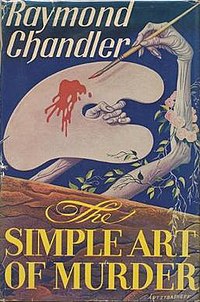Raymond Chandler was born on July 23, 1888.
On the 125th anniversary of his birth, we take a look at the origin of his most
iconic phrase, "mean streets." Who actually coined it, and who used
it in a story first?
By Lars
Trodson
Raymond
Chandler is almost always cited as the man who coined the phrase "mean
streets." His essay, "The Simple Art Of Murder," contains the
oft-repeated quote: "Down these mean streets a man must go who is
not himself mean, who is neither tarnished nor afraid." The essay first
appeared in The Atlantic Monthly in 1944 and was reprinted in an anthology in
1950 under that same title.
The Library of America, on its
page about Chandler, writes: "In his first novel, The Big Sleep (1939),
the classic private eye finds his full-fledged form as Philip Marlowe: at once
tough, independent, brash, disillusioned, and sensitive—and man of weary honor
threading his way (in Chandler's phrase) "down these mean streets"
among blackmailers, pornographers, and murderers for hire."
In an article published on June
5, 2013 in Los Angeles Magazine titled "The 10 Most Iconic Cop Shows SetIn the Mean Streets of L.A", the author writes: "'Down these mean
streets a man must go who is not himself mean...' Raymond Chandler, the patron
saint of pulp noir, once wrote."




.jpg/220px-A_Christmas_Carol_(1971_film).jpg)